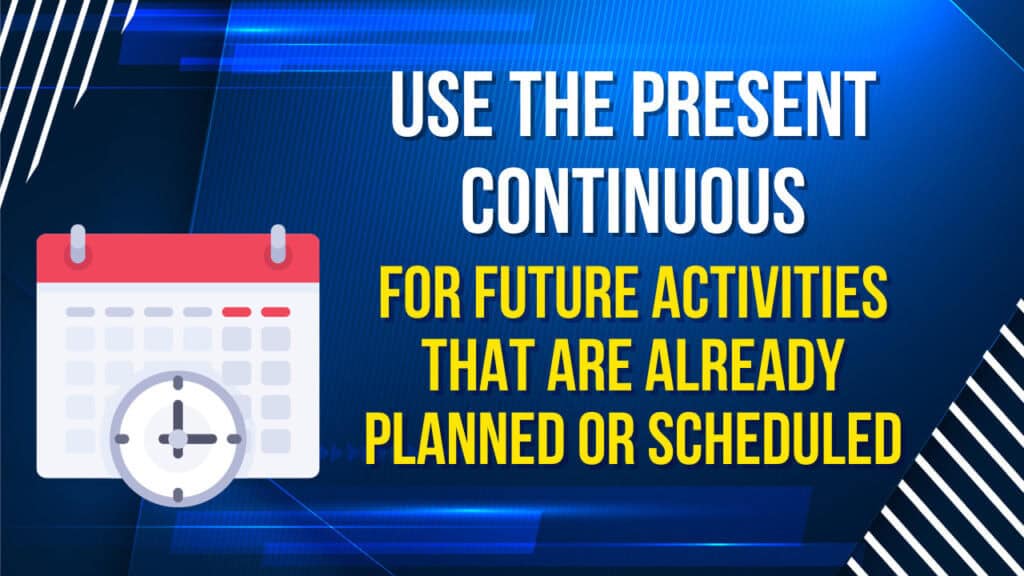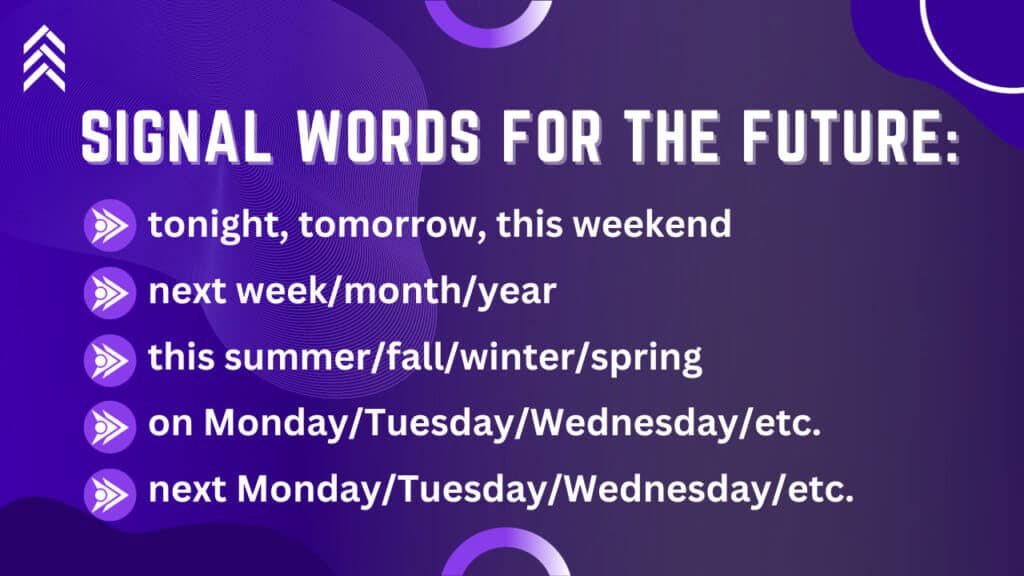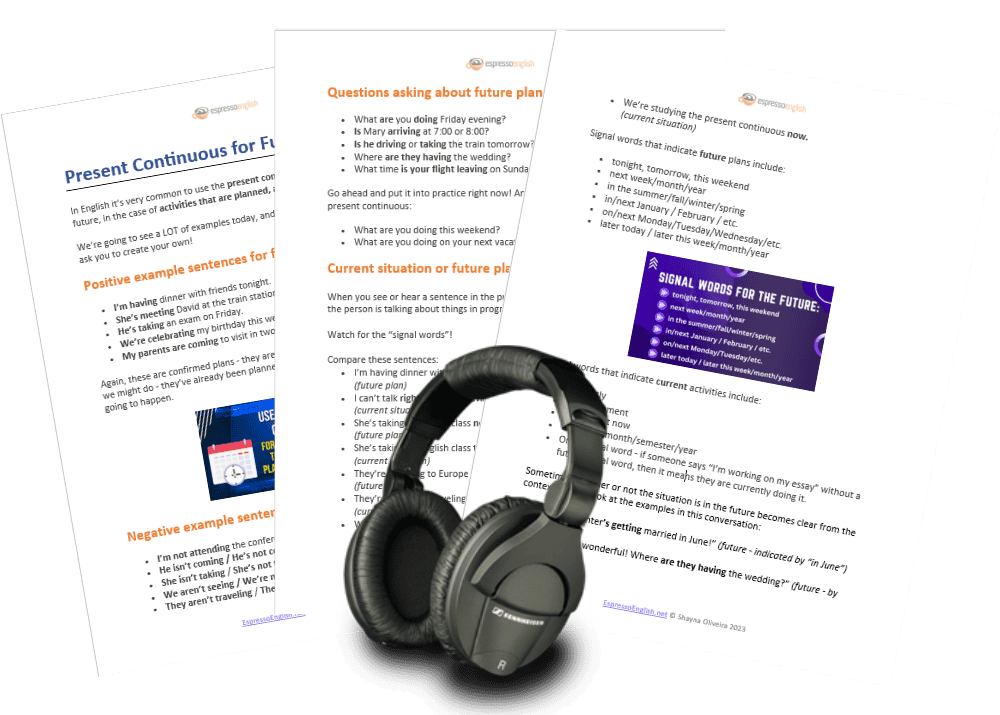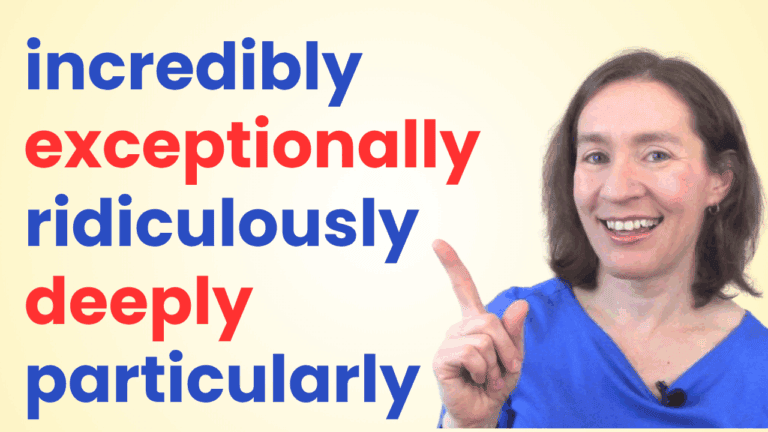
In English it’s very common to use the present continuous to talk about the future, in the case of activities that are planned, arranged, or scheduled:
Positive example sentences using the present continuous for future arrangements:
- I’m having dinner with friends tonight.
- She’s meeting David at the train station tomorrow.
- He’s taking an exam on Friday.
- We’re celebrating my birthday this weekend.
- My parents are coming to visit in two weeks.
Negative examples of present continuous for future plans (or, rather, lack of plans!):
- I’m not attending the conference next month.
- He isn’t coming / He’s not coming to the party on Saturday.
- She isn’t taking / She’s not taking any math classes next semester.
- We aren’t seeing / We’re not seeing our family this summer.
- They aren’t traveling / They’re not traveling anywhere during spring break.
Questions using the present continuous to ask about future arrangements:
- What are you doing Friday evening?
- Is Mary coming at 7:00 or 8:00?
- Is he driving or taking the train tomorrow?
- Where are they having the wedding?

Current situation or future plans?
When you see or hear a sentence in the present continuous, how can you tell if the person is talking about things in progress currently or plans for the future?
Watch for the “signal words”!
Compare these pairs of sentences:
- I’m having dinner with friends tonight.
(future plan) - I can’t talk right now – I’m having dinner with friends.
(current situation) - She’s taking an English class next semester.
(future plan) - She’s taking an English class this semester.
(current situation) - They’re traveling to Europe on Saturday.
(future plans) - They’re currently traveling in Europe.
(current situation) - We’re studying the present continuous later this week.
(future plans) - We’re studying the present continuous now.
(current situation)
Signal words that indicate future plans include:
- tonight, tomorrow, this weekend
- next week/month/year
- this summer/fall/winter/spring
- on Monday/Tuesday/Wednesday/etc.
- next Monday/Tuesday/Wednesday/etc.

Sometimes whether or not the situation is in the future becomes clear from the context. Take a look at the examples in this conversation:
“My daughter’s getting married in June!” (future – indicated by “in June”)
“Oh, how wonderful! Where are they having the wedding?” (future – by context)
“They’re not sure – they’re still thinking about it. (current – indicated by “still”) On Sunday they’re checking out (future – indicated by “on Sunday”) a church that might be a possibility.”
“Sounds great! Hey, I’ve gotta run – I’m picking up my son from soccer practice in 20 minutes.” (future – indicated by “in 20 minutes”)
“Oh, is he playing on the high school team?” (current – by context)
“Yes, and he’s hoping to get an athletic scholarship to college.” (current – by context)
“Good for him. Well, I’m volunteering at the school fundraiser tonight, (future – indicated by “tonight”) so I might see you there later.”
Now that you know how to use the present continuous for future arrangements, make some sentences talking about your own plans! Answer these questions using the present continuous + a signal word for the future:
- What are you doing tomorrow?
- What are you doing this weekend?
- What are your plans for the next holiday (Christmas, etc.)?
- What are you doing on your next vacation / school break?











